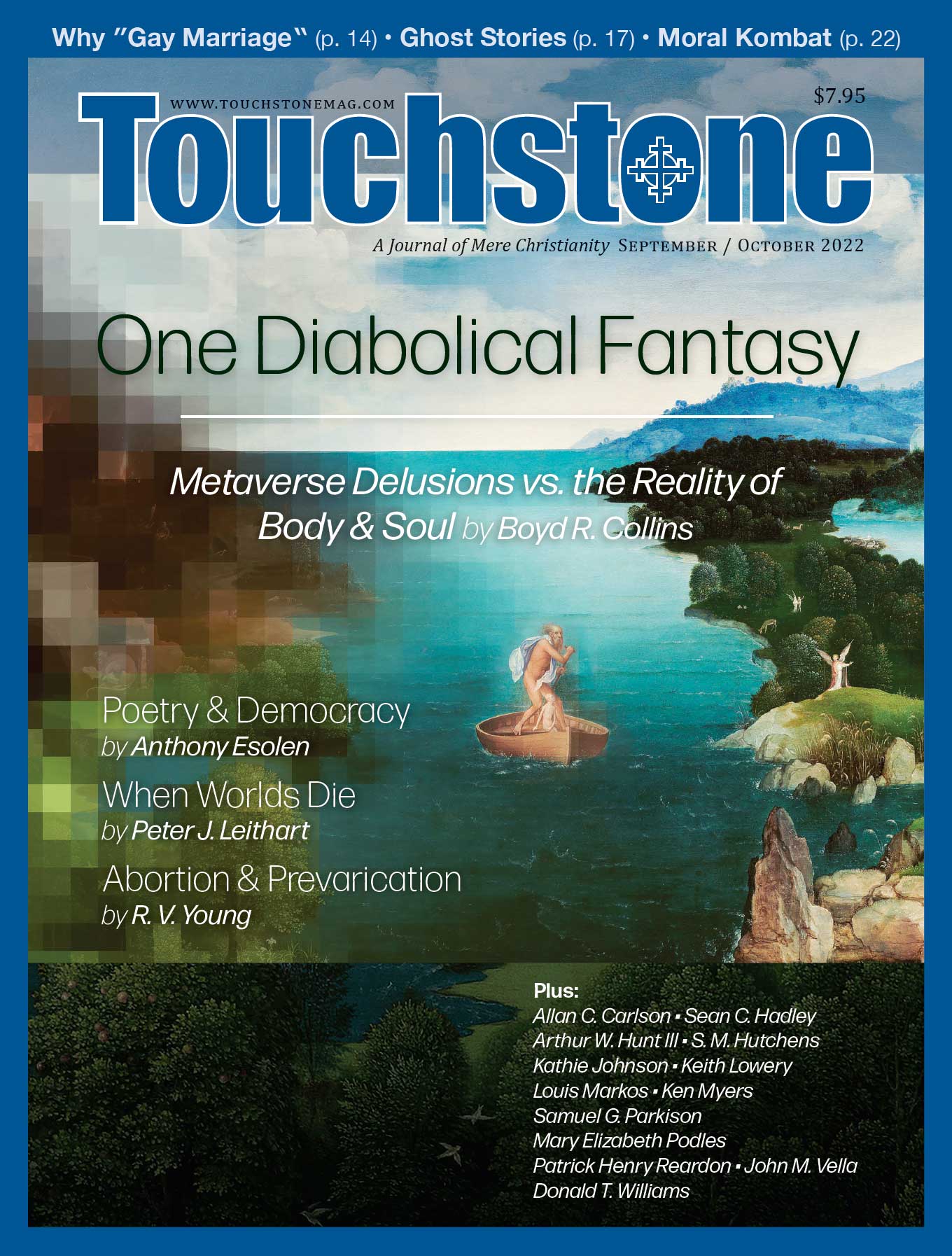One Diabolical Fantasy
Metaverse Delusions vs. the Reality of Body & Soul
According to tech billionaire Marc Andreessen, most people will have a far better life if they abandon what he called “the quote-unquote real world.” In an interview posted on Substack last year, Andreessen, one of Meta’s directors, described himself as a member of what he called the “Reality Privileged,” those who live in “a real-world environment that is rich, even overflowing, with glorious substance, beautiful settings, plentiful stimulation, and many fascinating people to talk to, and to work with, and to date.” As a member of the Reality Privileged, he’s concerned for the Reality Deprived, and he suggested a fix:
[R]eality has had 5,000 years to get good, and is clearly still woefully lacking for most people; I don’t think we should wait another 5,000 years to see if it eventually closes the gap. We should build—and we are building—online worlds that make life and work and love wonderful for everyone, no matter what level of reality deprivation they find themselves in.
Rather than trying to make the real world more liveable for everyone, the Reality Privileged are building a metaverse that will provide each member of the Reality Deprived with his or her own digital paradise.
But what would a human being have to become to feel truly satisfied with the fulfillments available in a virtual world? Aren’t most of us driven by an insatiable hunger after truth, beauty, and goodness, however bleak their contemporary manifestations? Is not the abandonment of that search equivalent to spiritual death? Once we investigate what type of human being the metaverse is designed for, we will be able to understand how these worlds are likely to transform the human soul.
In 2021, Mark Zuckerberg announced that Facebook had begun its transition to a full-immersion virtual reality (VR) platform. To emphasize the pivotal nature of this shift, he changed his company’s corporate name to Meta Platforms, Inc. The “embodied internet” he envisions is an evolution of the current internet that would allow an unlimited number of users to share 3D virtual worlds simultaneously.
Each user will be able to design a personal avatar that will function as his or her primary identity, though multiple avatars will also be supported. As users travel through the metaverse, their personal data will be continually tracked. This means that they will be able to accumulate credit and make payments that will be securely tied to their metaverse identities. Zuckerberg’s vision assumes that we will work, shop, socialize, become educated, and be entertained in digitally fabricated domains. He seems convinced that the metaverse will one day be the primary reality for his platform’s users, who currently number 2.9 billion.
Many tech leaders believe that, for most people, the real world can’t compete with what Jane McGonigal describes in her influential book, Reality Is Broken, as
the carefully designed pleasures, the thrilling challenges, and the powerful social bonding afforded by virtual environments. Reality doesn’t motivate us as effectively. Reality isn’t engineered to maximize our potential. Reality wasn’t designed from the bottom up to make us happy. . . . Reality, compared to games, is broken.
In other words, instead of subsisting in the “broken reality” of the God-created cosmos, these tech lords are convinced that most people will prefer to live in environments designed to guarantee human happiness. Once these become available, the “desert of the real” may end up being inhabited only by the outcasts from electronic heaven.
There are two major ways to reason morally about machine-generated reality. If we regard it as a neutral technology, then its potential for misuse lies primarily in the greed and power-seeking of its owners. For instance, it could be used to indoctrinate its denizens with a political ideology. On the other hand, if the inherent nature of the technology requires a model of the human being that degrades body, mind, or spirit, then it may be seen as an abuse of science analogous to contraception. Note that the term “metaverse” as used here is not a synonym for “virtual reality” but a specific application of that technology as envisioned by tech leaders such as Mark Zuckerberg. As we will see, once we uncover the theology of the person that informs the metaverse, the latter’s lack of neutrality will become obvious.
Boyd R. Collins worked as a web developer for nearly three decades. Now retired, he writes and lectures about social media addiction and related topics. In 2021, he presented his findings on social media addiction at the International Conference on Artificial Intelligence at the Colegio San Agustin in the Philippines.
subscription options
Order
Print/Online Subscription

Get six issues (one year) of Touchstone PLUS full online access including pdf downloads for only $39.95. That's only $3.34 per month!
Order
Online Only
Subscription

Get a one-year full-access subscription to the Touchstone online archives for only $19.95. That's only $1.66 per month!
bulk subscriptions
Order Touchstone subscriptions in bulk and save $10 per sub! Each subscription includes 6 issues of Touchstone plus full online access to touchstonemag.com—including archives, videos, and pdf downloads of recent issues for only $29.95 each! Great for churches or study groups.
Transactions will be processed on a secure server.
more on culture from the online archives
more from the online archives
calling all readers
Please Donate
"There are magazines worth reading but few worth saving . . . Touchstone is just such a magazine."
—Alice von Hildebrand
"Here we do not concede one square millimeter of territory to falsehood, folly, contemporary sentimentality, or fashion. We speak the truth, and let God be our judge. . . . Touchstone is the one committedly Christian conservative journal."
—Anthony Esolen, Touchstone senior editor













